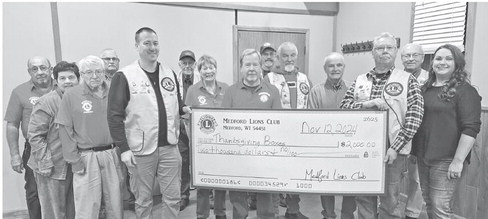County looks at needing more help to monitor broadband efforts
Taylor County has spent millions of dollars with the construction of a broadband middle-mile network. It has committed millions more of its borrowing capacity to work with a provider to bring service to more rural areas of the county.
The question facing the county is who will oversee the system going forward and make sure contracts are being met and grants are being applied for.
For the past four years much of that work has fallen to broadband committee chairman Mike Bub. “I am spending 15 to 20 hours per week on this and I physically can’t keep up,” Bub said to the other members of the county’s executive committee meeting on Tuesday.
He said that when they started, they had no anticipation that it would become as big as it is. In addition to the fiber and tower networks that are built or under construction, Bub said the county received an $18,000 planning grant from the state in order to apply for a grant that would bring $15 to $20 million to the county to extend fiber to homes.
Bub said broadband committee member Gene Knoll brought up the question several months ago of how the county was going to manage $23 million in existing broadband infrastructure. Bub said with the potential to get another $15 to $20 million the need is even greater.
Bub said he saw three options. The first is for the county to do nothing and hope for the best. The second is to hire a broadband coordinator with the job of applying for grants and managing the county’s network. This would bring with it a cost of about $72,000 a year, based on potential job duties and market rates for similar positions.
The third, and potentially most viable option, was to reorganize the information technology department to include additional support to be able to take on these duties.
The question, Bub said, is how to pay for it. He said that if the county gets the $15 million in potential grants that are in the pipeline, the money issue becomes insignificant. He suggested there are ways to make it cost neutral based on the increased funds coming in from additional companies leasing access to the county’s fiber optic network.
County board chairman Jim Metz suggested the county should look to retired executives and others who have worked in the field and see if there is interest there.
Bub said he has approached a few and many of them are still working or are not interested in the time commitment. However, he said that would not be a bad way to go. He suggested that if the county were to hire someone that they do it as a contract employee to avoid needing to pay benefits.
One of the highest priorities, Bub said, is having someone there who is able to do grant writing for the massive amount of federal grants that have become available for broadband expansion.
Committee member Scott Mildbrand questioned if the IT department would could absorb those types of duties while bringing on someone at the entry level who could learn to write grants.
Bub agreed and said in the long term that is where the county needed to go to maintain the investment for the next 20 years. He said the question is how does the county get from where they are today to having that person on board and trained.
“You will have to guide us during that length of time,” Metz said, referring to Bub as committee chairman.
Bub suggested one other option, which he described as being a last resort, was for him to resign from the county board and be hired by the county to take on the role for six months while they get someone up to speed. He said that there is no way he could be paid by the county to do the work while still serving on the county board. He said this is not an option that he wants to do.
Mildbrand noted that there is another county board election next spring and that nothing would prevent Bub from stepping down now and coming back to run for a spot then.
“I am searching for a solution. If I had a plan I would suggest it,” he said.
While other county departments routinely write grants for their areas, Bub said one of the challenges of IT grants are they are highly technical and need to include specific language and phrases in order to be considered. He worried that it would take him longer to explain it to someone than to do at least this round of applications himself.
The next grant deadline is June 19. The county human resources director said it would be at least mid-June before they could get someone on board if they started the hiring process now and could find someone.
For now, Bub will continue working on the grant application and said he would be reaching out to Northwest Regional Planning about contracting with them for future grant writing.
He will also continue working with the information technology department as the committee chairman, to develop a reorganization plan with IT director Melisa Lind and other members of the department staff.
“I have been doing it for four years, I can do it for 60 more days,” Bub said, of continuing to do the work as a committee chairman.
The IT committee will work on a proposal for reorganizing the department to include the broadband and bring it to the finance and personnel committee with a recommendation.
Social media accounts
Who speaks for the county? And, who should be speaking for the county?
Those are the fundamental questions raised to executive committee members by county administrative coordinator Nicole Hager in regard to departmental social media usage.
Hager asked committee members to support a policy that would bring individual department social media sites under more oversight from both her office and the county’s information technology department.
Several county departments have presences on social media including Facebook pages. The intent of these is to share information with the general public.
Concerns arise, however, when opinions are expressed by staff members on the pages.
The initial understanding for social media was to set them up departments would need to go through the IT department. This way, explained Lind, the IT department would have administrative control if the staff member left or was removed and be able to shut that person out of being able to post things or make changes to the pages.
“We have been pretty lucky so far,” Lind said, however there are some now where her department does not have administrative rights. She raised concern that if there was a disgruntled employee, damage could be done.
Bub said he would like the policy to go a step further and address what county employees post on their personal social media pages. He said while they have the right to have their own personal opinions, they don’t have a right to represent Taylor County in expressing those opinions. He said he would object to them stating that in their capacity as a county staff person, expressing opinions about something the county was involved with. “Who is our spokesperson?” he asked, saying that statements should only be coming through the department heads for their areas.
“We have gotten into trouble where people are posting and we don’t have any control over it,” Hager said. She cautioned that it has been litigated elsewhere over employees right to post their opinions to social media.
Bub said the employees’ are welcome to their opinions, but wanted it to be made clear that when doing so the employees are speaking solely for themselves and not speaking for the county.
Committee members voted to authorize Hager to create a policy for social media use and that any social media pages must be created by going through the IT department. Hager said she has a draft policy and will bring it to the department head meeting next week.


